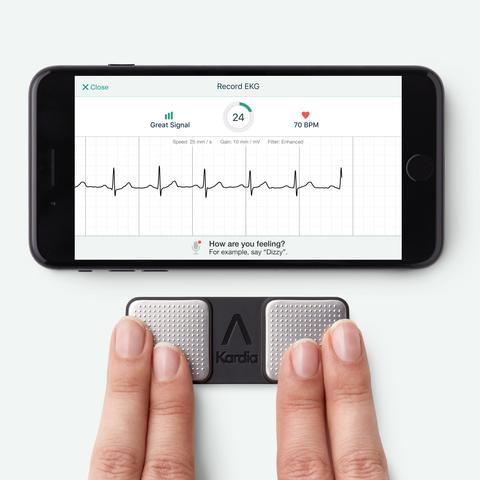
Smartphone ECG device KardiaMobile rolled out to NHS to combat atrial fibrillation
pharmafile | February 14, 2018 | News story | Research and Development | KardiaMobile, NHS, atrial fibrillation, pharma
AliveCor has announced that it has begun the rollout of its KardiaMobile technology to the NHS via the UK’s Academic Health Science Networks (AHSNs) as part of a project funded by NHS England to accelerate diagnosis of atrial fibrillation (AF), a potentially fatal heart rhythm condition.
Affecting 1.4 million people in the UK, and with an estimated 500,000 cases undiagnosed due to fleeting symptoms which may not be present under GP inspection, AF is the most common variety of heart arrhythmia and a contributing factor in up to 20% of strokes in the country.
KardiaMobile is a credit card-sized device which records the electrical activity of the heart through a user’s fingertips, relaying electrocardiogram data to its companion app on their smartphone in less than 30 seconds. These readings can be saved or shared with healthcare professionals, allowing for faster detection and diagnosis of AF.
“Introducing this innovative technology to GP surgeries and hospitals gives healthcare professionals a quick and simple way of recording an ECG without the need to send a patient to hospital,” remarked Trudie Lobban MBE, Founder & CEO at the Arrhythmia Alliance & AF Association. “Due to the size of KardiaMobile patients can even take the device away from a consultation. Patients can record their heart’s electrical activity whenever. The device can be used at any time, regardless if they show signs of symptoms or not. This ultimately means AF can be diagnosed faster, anticoagulation therapy can be prescribed to reduce the risk of an AF-related stroke and treatment for AF can be accelerated.”
AliveCor claims that use of the technology could save the NHS up to £2 billion by cutting costs associated with achieving an AF diagnosis, which can take months or years and often require sending suspected patients to hospital for expensive ECGs.
Use of the technology has been supported by 15 AHSNs through the NHS Innovator Accelerator. Stroke physician and leader of the AHSN project Professor Gary Ford commented: “More than 420,000 people throughout England are unaware they have irregular heartbeats and of the dangers that this can pose to their health. We have highly effective treatments that can prevent these strokes, but early detection is key. Using cost-effective technology, the NHS will now be able to identify people with irregular heartbeats quickly and easily. This will save lives.”
He added: “As the NHS approaches its 70th birthday this year, this is also a great reminder of the way that healthcare is continually evolving and innovating. Taking advantage of digital health solutions will be even more important for the next 70 years. Today’s new devices are just one example of the way that low-cost tech has the potential to make a huge difference.”
Matt Fellows
Related Content

NICE recommends migraine treatment for NHS use
The National Institute for Health and Care Excellence (NICE) has shared draft guidance recommending AbbVie’s …

Acesion Pharma raises €45m series B funding
Acesion Pharma has announced that it has closed an oversubscribed €45m series B financing round. …

Novo Nordisk launches Wegovy in the UK
Novo Nordisk has today announced that Wegovy (semaglutide injection) is now available in the UK …








